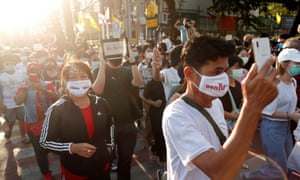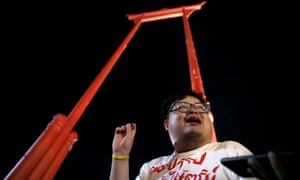In Bangkok, Thailand, on Saturday, tens of thousands took part in continuing pro-democracy protests following a government crackdown Friday, which saw riot police unleash water cannons containing a chemical irritant on crowds calling for the resignation of Prime Minister Prayuth Chan-ocha.
Protests against the prime minister began in March this year, following the dissolution of a popular pro-democracy party, but have dramatically increased in size this week, with crowds numbering in the tens of thousands.
The government responded to these growing protests with an emergency decree on Thursday, which banned groups of more than five people and gave police the authority to make areas of Bangkok off limits to protesters. Along with this new measure have come the arrests of protesters, including a human rights lawyer and several student activists.
The protesters have released several demands, chief among them that the prime minister resign. A former general, Prayuth seized power in a 2014 military coup. A new constitution was put in place by military leaders three years later that sets aside parliament seats for military officials — so many that protesters argue the prime minister will maintain power regardless of the outcome of elections.
As Panu Wongcha-um reported for Reuters, protesters made three demands in July: “the dissolution of parliament, an end to harassment of government critics, and amendments to the military-written constitution.”
Demonstrators are still working towards those goals, but increasingly, protesters are demanding changes to the country’s monarchy as well.
As Richard Bernstein has explained for Vox, citizens of Thailand have traditionally avoided statements that could be seen as critical of the royal family, which is currently led by King Maha Vajiralongkorn, due to the country’s “lèse-majesté laws, which outlaw ‘defaming, insulting, or threatening’ of a member of the royal family.”
That has changed: For example, at an August protest, a student protest leader gave a speech accusing the government of “fooling us by saying that people born into the royal family are incarnations of gods and angels,” and asking, “Are you sure that angels or gods have this kind of personality?”
The king, who ascended to the throne four years ago, rules largely from Europe, but has nevertheless spent extravagantly and “steadily amassed power” in a way that harks back to the bygone days of Thailand’s absolute monarchy, according to the Economist. His support for the prime minister has frustrated Prayuth’s critics, and his successful efforts to bring royal wealth and military forces under his direct control have led some protesters to call for new limits on the monarchy’s powers.
Arrests for breaching the country’s lèse-majesté laws have continued, and Friday, two protesters were charged under an obscure law for “an act of violence against the queen’s liberty,” — in this case, for yelling near Queen Suthida Vajiralongkorn Na Ayudhya’s motorcade. The two protesters face a potential sentence of life in prison for “endangering the royal family.”
These charges — as well as threats from the prime minister — have not deterred the protesters. After Friday’s police offensive, the demonstrations that continued Saturday appear to have remained largely peaceful — and were well-attended despite a shutdown of Bangkok public transit. As many as 23,000 people turned out at several locations around the city, according to a police estimate reported by the Bangkok Post.
“The goal is to change the whole political system, including the monarchy and the prime minister,” one Bangkok student told the New York Times.
A democratic legitimacy crisis
As Vox’s Zeeshan Aleem explained in August, Thailand’s protests hinge on the tenuous legitimacy of the current government.
Though current prime minister Prayuth ostensibly won another mandate in 2019, the results of that election are disputed. Since then, a major opposition party has been disbanded by the courts, and pro-democracy activist Wanchalearm Satsaksit was reported as disappeared in Cambodia, possibly taken on the orders of the Thai government.
Wanchalearm hasn’t been seen since his abduction in June, and Jakrapob Penkair, another dissident living in exile, told the BBC in July that Wanchalearm, also known as Tar, was likely dead.
“I think the message is: ‘Let’s kill these folks. These are outsiders, these are people who are different from us and they should be killed in order to bring Thailand back to normalcy,’” Jakrapob said. “But nothing could be more wrong in that interpretation. I believe their decision to kidnap and murder Tar, and others before him, has been subconsciously radicalizing the people.”
The protest movement has been fueled by student activism, but lacks defined leadership, according to the BBC. That’s by design — activists have reportedly drawn inspiration from decentralized pro-democracy protests in Hong Kong in order to maintain momentum amid arrests.
In part in order to circumvent restrictions on speech, activists have also relied on pop culture symbolism at protests. According to Aleem,
Protesters have used creative methods drawn from the world of popular fiction to veil their criticism of the government and mitigate charges for violating restrictions on political speech. For example, some protesters have dressed up as characters from Harry Potter in order to advance their arguments against the government and monarchy. Other pro-democracy protesters display three-finger salutes inspired by the Hunger Games series.
The Thai government’s crackdown on protesters has been condemned by multiple international organizations. Human Rights Watch, for instance, argued that the ban on protests, as well as other new restrictions, meant that “rights to freedom of speech and holding peaceful, public assemblies are on the chopping block from a government that is now showing its truly dictatorial nature.” Amnesty International has decried the arrests of protesters as an intimidation tactic.
It’s unlikely that the protest movement will stop soon, though — even if the government’s response begins to echo the violent anti-protest crackdowns Bangkok saw in the 1970s.
“The dictatorship must be confronted by the people, even under the threat of arrest,” activist Panupong Jadnok told the Washington Post. “We won’t step back. We will fight until our death.”



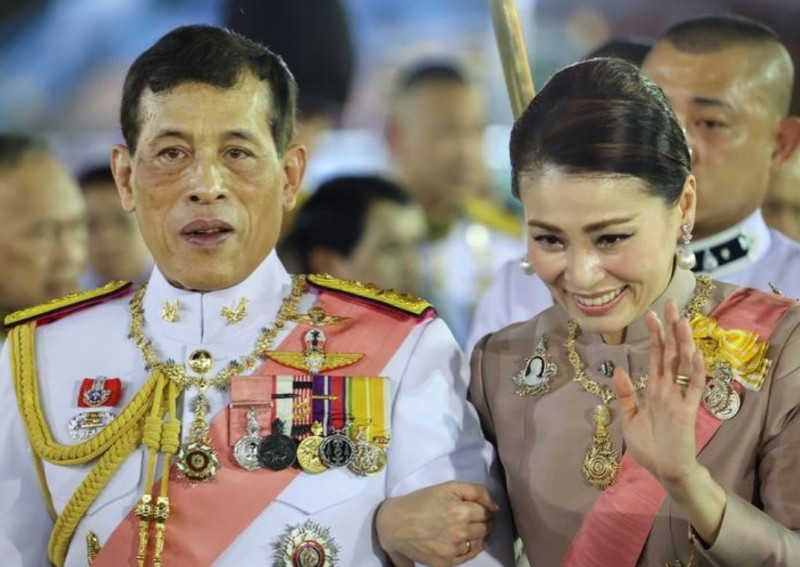
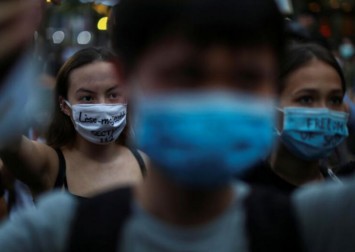

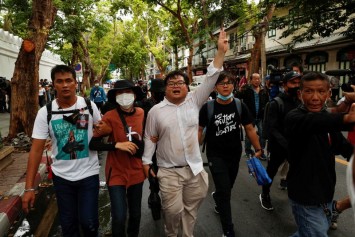



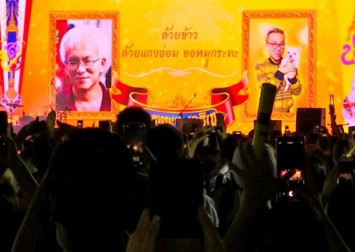

/cdn.vox-cdn.com/uploads/chorus_image/image/67647948/1229122703.jpg.0.jpg)



